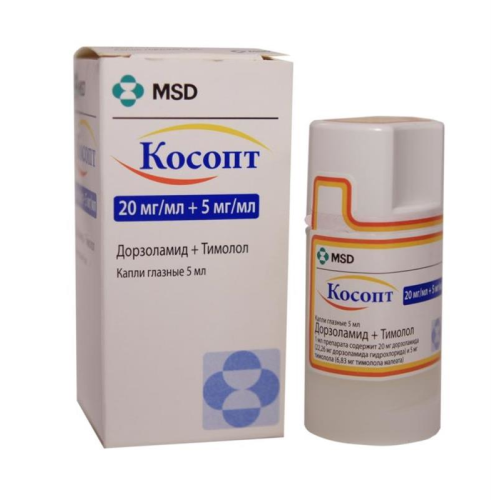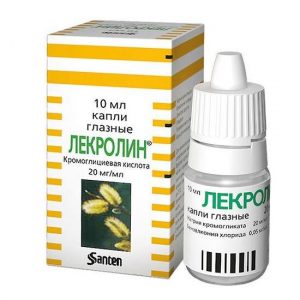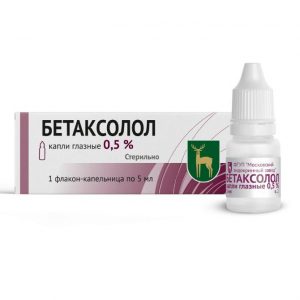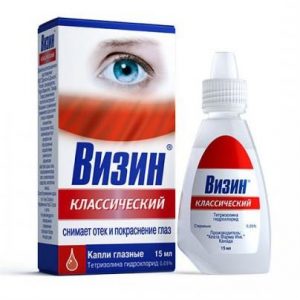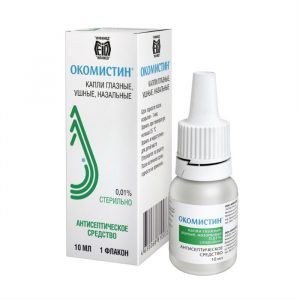Description
Latin name
Cosopt
Release form
Korneregel. Eye drops
Packing
5 ml – plastic bottles of the type Oculometer plus (1) – packs of cardboard.
Indications
For the treatment of increased intraocular pressure with:
Open-angle glaucoma.
Pseudoexfoliation glaucoma.
Contraindications
Bronchial asthma (including history).
Severe COPD.
Sinus bradycardia.
AV block II and III degree.
Severe heart failure.
Cardiogenic shock.
Severe renal failure (CC (creatinine clearance) less than 30 ml / min).
Dystrophic processes in the cornea.
Pregnancy.
Lactation (breastfeeding).
Children and adolescents under 18 years of age (as efficacy and safety are not well understood).
Hypersensitivity to the drug.
Use during pregnancy and lactation
The drug is contraindicated in pregnancy and lactation (breastfeeding).
Composition
1 ml contains
Active substances:
20 mg of dorzolamide base (22.26 mg of dorzolamide hydrochloride) and 5 mg of timolol base (6.83 mg timolol maleate).
Excipients:
benzalkonium chloride (as a 50% solution of benzalkonium chloride) 0.075 mg (0.15 mg), sodium citrate 2.94 mg, mannitol 16.00 mg, hyetellose (hydroxyethyl cellulose) 4.75 mg, 1M sodium hydroxide solution qs to pH 5.6, water for injection qs up to 1 ml.
Dosage and administration
The drug is prescribed 1 drop in the conjunctival sac of the affected eye (or in both eyes) 2 times / day.
If Kosopt is prescribed as a replacement for another ophthalmic drug for the treatment of glaucoma, the latter should be canceled the day before the start of Kosopt’s use. In case of joint use with other eye drops, Cosopt should be prescribed with an interval of at least 10 minutes. Cosopt is a sterile solution, so patients should be instructed on how to use the bottle.
Instructions for use: Before the first use of the drug, make sure that the protective strip outside the bottle is not damaged. Unopened vials may have a gap between the vial and the cap.
Remove the protective strip in order to open the cap.
To open the bottle, you need to unscrew the cap by turning it in the direction of the directional arrows on the top surface of the cap.
Tilt your head back and slightly pull the lower eyelid down to make space between the eyelid and the eye.
Turn the bottle over, gently press with your thumb or forefinger in a place specially marked on the bottle so that one drop gets into the eye. Do not touch the surface of the eye or eyelid with the tip of the vial. If used improperly, the vial can become infected and cause serious infectious damage to the eye and subsequent loss of vision.
Repeat steps 4 and 5 for each eye if the drug should be instilled into both eyes.
Close the vial with a cap, twisting it until it is in firm contact with the vial. Do not press the cap too hard, otherwise the bottle or cap may be damaged.
Do not enlarge the hole on a specially designed dispensing tip.
Side effects
Cosopt is generally well tolerated. In clinical studies, side effects unique to this combination drug were not observed. Adverse reactions were limited to the already known side effects of dorzolamide hydrochloride and / or timolol maleate. In general, systemic side effects were mild and did not lead to drug discontinuation.
In clinical trials, Cosopt was prescribed to 1035 patients. About 2.4% of patients, the drug was discontinued due to local adverse reactions from the eye. About 1. In 2% of patients, the drug was canceled due to local adverse reactions such as hypersensitivity or allergies.
Side effects from the organ of vision were most often observed: burning sensation or itching in the eye, taste distortion, corneal erosion, conjunctival injection, blurred vision, lacrimation.
The following are possible side effects of the components of the drug.
Dorzolamide hydrochloride
On the part of the organ of vision: inflammation of the eyelid, irritation and peeling of the eyelid, iridocyclitis, acupuncture keratitis, transient myopia (which occurs after drug withdrawal).
From the nervous system: headache, dizziness, paresthesia.
Allergic reactions: angioedema, bronchospasm, urticaria, pruritus.
Other: asthenia / fatigue, nosebleeds, pharyngeal irritation, dry mouth, rash.
Timolol maleate (topical application)
On the part of the organ of vision: conjunctivitis, blepharitis, keratitis, decreased sensitivity of the cornea, dryness of the visual disturbance, including changes in the refractive power of the eye (in some cases due to cancellation of the myotics), diplopia, ptosis.
From the cardiovascular system: tinnitus, arrhythmia, hypotension, fainting, cardiovascular disorders, rhythm disturbances, cardiac arrest, edema, lameness, paresthesia, Raynaud’s phenomenon, lowering the temperature of the arms and legs.
From the respiratory system: bronchospasm (mainly in patients with previous bronchial obstruction), cough.
Dermatological reactions: alopecia, psoriasis-like rashes or exacerbation of psoriasis.
Allergic reactions: anaphylaxis, angioedema, urticaria, local or generalized rashes.
From the side of the central nervous system: dizziness, depression, insomnia, nightmares, decreased memory, increased symptoms of myasthenia gravis.
From the digestive system: diarrhea, dyspepsia, dry mouth.
On the part of the body as a whole: headache, asthenia, fatigue, chest pain, decreased libido, Peyronie’s disease, systemic lupus erythematosus.
Drug Interaction
No specific studies of the interaction of Cosopt with other drugs have been performed. However, there is a possibility of enhancing the antihypertensive effect and / or the development of pronounced bradycardia with the joint use of an ophthalmic solution of timolol maleate and calcium channel blockers, catecholamine-depleting agents, beta-adrenoblockers, antiarrhythmic drugs (including amiodarospermites, glycomyronosites, glycomasronetics, glycomines, and glycomines) and MAO inhibitors.
The potential effect of systemic beta-blockade on adrenergic receptors (eg, decreased heart rate, depression) has been reported with the use of timolol and CYP2D6 inhibitors (eg, quinidine or selective serotonin reuptake inhibitors).
Although the dorzolamide carbonic anhydrase inhibitor, a constituent of Kosopt, is used topically, it can penetrate the systemic circulation. In clinical studies of the use of ophthalmic solution of dorsolamide hydrochloride, no HRD disorders were detected. However, with systemic use of carbonic anhydrase inhibitors, these disorders are known, and in some cases they may affect interaction with other drugs (eg, increase toxic reactions when high-dose salicylates are used). The possibility of such interaction should be considered in patients receiving Cosopt.
Systemic beta-blockers can enhance the hypoglycemic effect of antidiabetic drugs and hypertension, which is the effect of clonidine (clonidine) withdrawal.
In spite of the fact that the effect on the pupil is minimal or absent with Cosoptom monotherapy, there are isolated descriptions of the development of mydriasis when co-administered with timolol maleate and adrenaline.
There is a likelihood of an increase in known systemic effects of carbonic anhydrase inhibition when combined with topical and systemic carbonic anhydrase inhibitors. Since there is no data on the use of such a combination, the combined use of Cosopt and systemic carbonic anhydrase inhibitors is not recommended.
Overdose
There is no data on an accidental or deliberate overdose of Cosopt.
There have been described cases of unintended overdose of timolol maleate in the form of eye drops with the development of systemic effects of beta-blocker overdose for systemic use: dizziness, headache, shortness of breath, bradycardia, bronchospasm, cardiac arrest.
The most anticipated symptoms of an overdose of dorsolamide are electrolyte balance disturbances, acidosis development, and possible CNS side effects.
Treatment: Conduct symptomatic and supportive therapy. The level of electrolytes (primarily sodium) and the pH of blood plasma should be monitored. Studies have also shown that timolol is not excreted in dialysis.
Storage conditions
The drug should be stored out of the reach of children, protected from light at a temperature not exceeding 25 ° C.
Expiration
2 years. After opening the bottle for the first time, Cosopt should not be used for more than 4 weeks.
Deystvuyuschee substances
Dorzolamyd, Timolol
pharmacy terms for
Dosage form
Dosage form
drops ophthalmic
